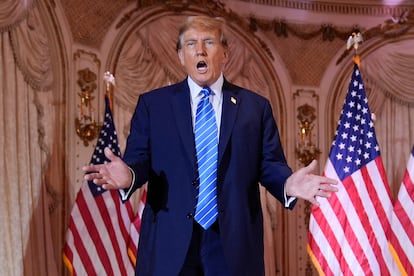The path to impunity has been cleared
The decision by the U.S. Supreme Court declaring Trump eligible for the presidency may result in the millionaire being exonerated from answering the criminal charges against him

Donald Trump is eligible. The nine justices of the Supreme Court, the sole and highest interpreters of the Constitution, have unanimously made the decision. They did so on Monday, rushing ahead of Super Tuesday so that the former president’s name could appear on the ballots on the decisive day that brings together the primaries of 15 States.
Jurisprudence does not affect the speed at which justices act, which varies according to the taste of the overwhelming majority that comprises the Supreme Court, six conservatives to three progressives. When Jack Smith, the special counsel handling Trump’s role in the assault on the Capitol, asked the nine justices in December to rule on whether the accused enjoyed presidential immunity, he received an immediate and dismissive refusal to even consider the case, yet the same court has taken all the necessary time to resolve the same issue when it was the accused himself who requested it after an appeals court rejected his claim of absolute immunity.
Delay tactics and calendar control are essential in Trump’s strategy to reach the White House without having been convicted, and then use his powers to exonerate himself of the 91 federal counts against him in four ongoing judicial processes. To achieve impunity, he had to first overcome the obstacle represented by the 14th Amendment, which states that individuals who have participated in an insurrection are ineligible to run for office. And this is already done. The Supreme Court has decided that such a limitation of rights, intended for Confederate slave owners defeated in the Civil War, could not be applied directly, much less so by the judges of a federated state such as Colorado.
There is little doubt about Trump’s attempt to remain as president in 2021 after losing the election, including his interference in the vote count and his coercion of congressmembers. It is not an issue that has interested the Supreme Court, despite the fact that both the Colorado ruling and the impeachment process in Congress recognize the insurrectionist nature of his actions. Instead, the justices have established that only Congress can legislate on his ineligibility, a simple way to make it difficult considering the disciplined Republican majority in the House of Representatives and the unattainable Democratic qualified majority in the Senate.
The four women justices of the Supreme Court disagree with this conclusion, which gives Trump free rein on his path towards impunity, and not only the three progressive ones, but also the conservative Amy Coney Barrett, who are all dissatisfied with the activism and lack of restraint displayed by the other five judges, all men and all conservatives and Trumpists. If the votes back him, Trump, who is already eligible, will be immune and go unpunished much like a king, sitting alone above the Constitution.
Sign up for our weekly newsletter to get more English-language news coverage from EL PAÍS USA Edition
Tu suscripción se está usando en otro dispositivo
¿Quieres añadir otro usuario a tu suscripción?
Si continúas leyendo en este dispositivo, no se podrá leer en el otro.
FlechaTu suscripción se está usando en otro dispositivo y solo puedes acceder a EL PAÍS desde un dispositivo a la vez.
Si quieres compartir tu cuenta, cambia tu suscripción a la modalidad Premium, así podrás añadir otro usuario. Cada uno accederá con su propia cuenta de email, lo que os permitirá personalizar vuestra experiencia en EL PAÍS.
¿Tienes una suscripción de empresa? Accede aquí para contratar más cuentas.
En el caso de no saber quién está usando tu cuenta, te recomendamos cambiar tu contraseña aquí.
Si decides continuar compartiendo tu cuenta, este mensaje se mostrará en tu dispositivo y en el de la otra persona que está usando tu cuenta de forma indefinida, afectando a tu experiencia de lectura. Puedes consultar aquí los términos y condiciones de la suscripción digital.









































